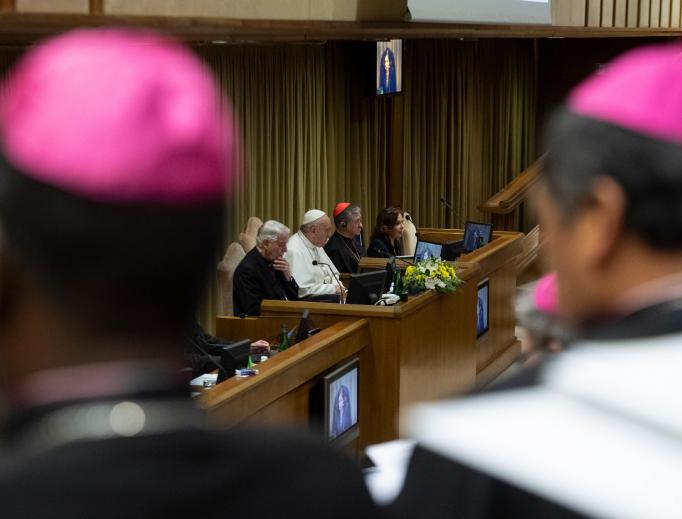|
After the Vatican Abuse Summit, What Comes Next?
By Tim Busch
The time has come for an “all-out battle.” So said Pope Francis at the conclusion of the Vatican’s first-ever summit on sexual abuse, which brought together the heads of bishops’ conferences from around the world, along with many cardinals. It was a powerful moment at the end of an important gathering, and the Pope deserves praise for convening the meeting and for his strong words. But the Pope’s exhortation doesn’t just apply to the bishops. It’s also a call to action for lay Catholics. In the wake of the summit, the faithful must support the Pope by prayerfully and respectfully requesting a greater role in the purification of our Church. For Catholics in the United States, our focus needs to be the U.S. Conference of Catholic Bishops’ upcoming assembly in June in Baltimore. We’ve been blessed with many bishops who are committed to reform, accountability and healing. We need to let them know that we support them, which is why the laity should encourage the bishops to use the Baltimore gathering to expand one of the most effective Church reforms in U.S. history — the Dallas Charter. The Dallas Charter was drafted by the bishops in June 2002 after the Boston abuse scandal hit earlier that year. It instituted many new and long-overdue procedures to crack down on predator priests. One of its most important reforms was the creation of lay review boards. These bodies, which exist in every diocese that adopted the Dallas Charter, are run by regular Catholics. They’re charged with creating new policies to prevent abuse and investigating allegations against priests. Before their inclusion in these boards, the faithful were largely uninvolved and unaware of the extent of the crisis. Thanks to the Dallas Charter, we’ve taken a leading role in ending it. And here’s the thing: Lay leadership works. The review boards help keep faithful priests in and predators out. They give faithful Catholics a chance to separate the truth from the falsehoods and the good from the bad. Combined with other reforms, including better seminarian selection and formation and training for church employees and teachers, the boards have helped make sexual abuse by any adult significantly rarer. In fact, the USCCB’s most recent report only found four credible allegations of abuse in 2017. While there will always be more to do to safeguard children, the Church is heading in the right direction. But despite this progress, the scandal of former Cardinal Theodore McCarrick and the Pennsylvania grand jury report make it clear that we have more work to do. And that’s where the Dallas Charter must be updated — and its lay review boards must be expanded and empowered. Right now, lay review boards are generally banned from investigating bishops. But as we saw with McCarrick and in Pennsylvania, bishops can be complicit in the protection of abusive priests — if not abusers themselves. To increase accountability, protect children and prevent cover-ups, the faithful need the Church’s approval to examine allegations against bishops. The laity’s role would not be to dole out discipline — that’s the Pope’s exclusive authority, absent a criminal act — but, rather, to shine a light on wrongs that need to be righted. Similarly, the boards are prohibited from investigating priests who break their vows of celibacy. This matters because priests who abuse minors, especially teenagers, may also target young adults. Just look at McCarrick, who preyed on a wide range of ages. If the faithful had the power to examine accusations against unfaithful, non-celibate priests and seminarians — and report credible issues to the local bishop or the appropriate authorities at the Vatican — we would provide an extra layer of protection for minors and children. The lay review boards are filled with men and women who care deeply about the Church. They’re designed to work in the spirit of love and compassion, not hate and spite. While many on the outside want to destroy the Church, the laity want to work from within to promote accountability, transparency, repentance and holiness. More powerful lay review boards would give us that chance. Fortunately, many of the bishops are ready to act. At the bishops’ conference’s assembly last November, Cardinal Daniel DiNardo of Galveston-Houston, the president of the USCCB, led the push for greater accountability, although the Vatican asked him to delay any action until after the February summit. Now that the summit is over, he and his fellow bishops are already preparing to move forward with real, meaningful reforms. As the bishops continue to discuss the options, we can encourage them to keep the Dallas Charter in mind. We already know the lay review boards work. Now it’s time to expand their scope — and their effectiveness. The result will be a healthier and holier Church. In the wake of the Boston scandal of nearly 20 years ago, we learned that the laity and Church leadership can work together to achieve reform. Today, we have a chance to prove this once again. Now is the time to talk to our priests, write our bishops, and join with our fellow parishioners to chart a path forward, starting at the June assembly. With so many recent scandals, now is the time to turn our anguish into action and our pain into prayerful petitions. And as we answer Pope Francis’ call to join this battle, let us also turn to the sacred Scriptures. For as St. Paul reminds us, “Let us not grow tired of doing good, for in due time we shall reap our harvest, if we do not give up.”
|
.
Any original material on these pages is copyright © BishopAccountability.org 2004. Reproduce freely with attribution.
